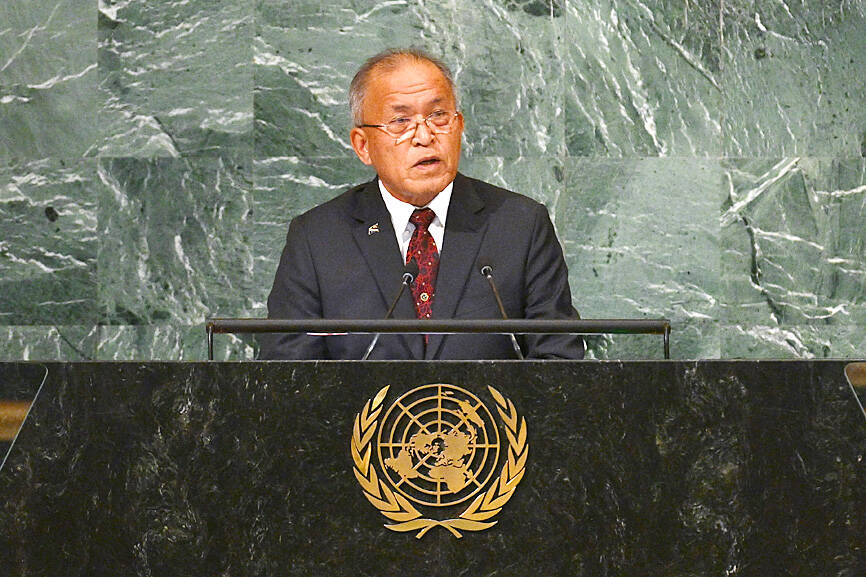Marshall Islands officials said they are ready to resume talks with the US this week on renewing a long-standing economic and security deal, provided Washington addresses grievances stemming from the testing of nuclear weapons on the Pacific archipelago more than 70 years ago.
The US detonated 67 nuclear bombs in the Marshall Islands from 1946 to 1958, and the health and environmental impacts are still felt on the islands and atolls that lie between Hawaii and the Philippines.
US special envoy Joseph Yun is scheduled to land in the capital, Majuro, tomorrow to resume negotiations on extending the 20-year Compact of Free Association, part of which expires next year.

Photo: AFP
Marshall Islands negotiators first want the US to pay more of the compensation awarded by the international Nuclear Claims Tribunal, totaling more than US$3 billion, of which about US$270 million has been paid so far.
Officials in Majuro broke off talks in September to renew the compact, a key international agreement between the US, the Marshall Islands, Micronesia and Palau.
The Marshall Islands said it would also be ready to resume talks with Yun if Washington tackled health and environmental issues stemming from its nuclear testing.
“We are ready to sign [a compact extension] tomorrow, once the key issues are addressed,” Marshall Islands Parliament Speaker Kenneth Kedi said.
“We need to come up with a dignified solution,” he said.
Kedi represents Rongelap Atoll, which is still affected by nuclear testing. He was encouraged by an agreement signed in late September by US President Joe Biden and Pacific island leaders, including Marshall Islands President David Kabua, that included references to the US commitment to addressing its nuclear past.
However, until that happens, “it casts a question mark on all the promises Washington has made,” Kedi said.
“If we can’t resolve issues from our past, how will it be going forward with other issues?” he said.
Thousands of Marshall Islanders were engulfed in a radioactive fallout cloud following the 1954 Castle Bravo nuclear test by the US military, and many subsequently experienced health problems.
Tonnes of contaminated debris from the testing was dumped in a crater on the Enewetak Atoll and capped with concrete that has since cracked, sparking health concerns.
Hundreds of islanders from the Marshall’s Bikini, Enewetak, Rongelap and Utrik atolls have also had to relocate due to nuclear contamination. Many are still unable to return home.
A study issued by the US National Cancer Institute in 2004 estimated that about 530 cancer cases had been caused by the nuclear testing.
“As Bikinians, we’ve done enough for the United States,” said Alson Kelen, chairman of the Marshall Islands’ National Nuclear Commission, who believes the US should pay the full amount of the compensation awarded.
“We’re not asking to be rich. We’re asking for funding to solve our nuclear problems ... really the funds are to mitigate and address the problems of our health, relocations and nuclear cleanups,” Kelen said.

The Burmese junta has said that detained former leader Aung San Suu Kyi is “in good health,” a day after her son said he has received little information about the 80-year-old’s condition and fears she could die without him knowing. In an interview in Tokyo earlier this week, Kim Aris said he had not heard from his mother in years and believes she is being held incommunicado in the capital, Naypyidaw. Aung San Suu Kyi, a Nobel Peace Prize laureate, was detained after a 2021 military coup that ousted her elected civilian government and sparked a civil war. She is serving a

China yesterday held a low-key memorial ceremony for the 1937 Nanjing Massacre, with Chinese President Xi Jinping (習近平) not attending, despite a diplomatic crisis between Beijing and Tokyo over Taiwan. Beijing has raged at Tokyo since Japanese Prime Minister Sanae Takaichi last month said that a hypothetical Chinese attack on Taiwan could trigger a military response from Japan. China and Japan have long sparred over their painful history. China consistently reminds its people of the 1937 Nanjing Massacre, in which it says Japanese troops killed 300,000 people in what was then its capital. A post-World War II Allied tribunal put the death toll

‘NO AMNESTY’: Tens of thousands of people joined the rally against a bill that would slash the former president’s prison term; President Lula has said he would veto the bill Tens of thousands of Brazilians on Sunday demonstrated against a bill that advanced in Congress this week that would reduce the time former president Jair Bolsonaro spends behind bars following his sentence of more than 27 years for attempting a coup. Protests took place in the capital, Brasilia, and in other major cities across the nation, including Sao Paulo, Florianopolis, Salvador and Recife. On Copacabana’s boardwalk in Rio de Janeiro, crowds composed of left-wing voters chanted “No amnesty” and “Out with Hugo Motta,” a reference to the speaker of the lower house, which approved the bill on Wednesday last week. It is

FALLEN: The nine soldiers who were killed while carrying out combat and engineering tasks in Russia were given the title of Hero of the Democratic People’s Republic of Korea North Korean leader Kim Jong-un attended a welcoming ceremony for an army engineering unit that had returned home after carrying out duties in Russia, North Korean state media KCNA reported on Saturday. In a speech carried by KCNA, Kim praised officers and soldiers of the 528th Regiment of Engineers of the Korean People’s Army (KPA) for “heroic” conduct and “mass heroism” in fulfilling orders issued by the ruling Workers’ Party of Korea during a 120-day overseas deployment. Video footage released by North Korea showed uniformed soldiers disembarking from an aircraft, Kim hugging a soldier seated in a wheelchair, and soldiers and officials